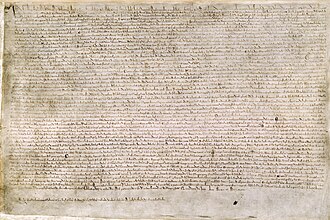| Act | Date | Description | Effect |
|---|
| 1066 | William of Normandy, feudal system, council of advisers | Advisers are tenants-in-chief (a person who held land) and ecclesiastics |
| 1215 | Magna Carta | Confers rights on the nobility and barons |
| 1265 | Simon de Montfort's Parliament | First representative parliament |
| 1295 | Edward I's Model Parliament adopts Montfort's scheme | Also summoned knights and burgesses; historically became known as the summoning of "the Commons" |
| 1341 | Commons first have a separate meeting | First example of bicameral system; the emergence of Parliament as an institution |
| 1430, 1432 | Introduction of formal property ownership qualification for voting rights, the forty shilling freeholders franchise | New uniform county franchise |
| 1535, 1542 | Union of England and Wales | Wales became a full and equal part of the Kingdom of England |
| 1547 | St Stephen's Chapel, in the Palace of Westminster became the meeting place of the House of Commons of England | |
| Petition of Right | 1628 | Assert certain rights of Parliament and the individual | Taxation requires parliamentary consent; writ of habeas corpus restated |
| 1649 | Charles I executed | Commonwealth of England |
| 1660 | Restoration of the monarchy | Culminated in the Glorious Revolution twenty-eight years later |
Bill of Rights (England & Wales)
Claim of Right (Scotland) | 1689 | Assert certain rights of Parliament and the individual | Contributed to parliamentary supremacy over the monarch; a landmark in the development of civil liberties in the United Kingdom |
| Acts of Union 1707 | 1707 | Union of England and Scotland | Created the Parliament of Great Britain |
| Acts of Union 1800 | 1801 | Union of Great Britain and Ireland | Created the Parliament of the United Kingdom |
| Great Reform Act, Second, and Third Reform Act | 1832, 1867, 1884 | Wider male franchise and more even representation | See history of elections in the United Kingdom |
| Ballot Act 1872 | 1872 | Secret ballot | See, for example, voting system |
| Parliament Act 1911 | 1911 | Payment of Members of Parliament introduced; reduced the maximum term of a parliament from seven years to five | With Parliament Act 1949, supremacy of the House of Commons |
| Representation of the People Act 1918 | 1918 | Universal male franchise and franchise expanded to include some women (above age 30 and meeting certain conditions) | All male adults and c. 40% of adult women gained suffrage (dependent on marital status, property ownership) |
| Equal Franchise Act 1928 | 1928 | Universal male and female suffrage from age 21 | Electoral equality between women and men |
| Representation of the People Act 1969 | 1969 | Voting age lowered to 18 | Franchise expanded |
